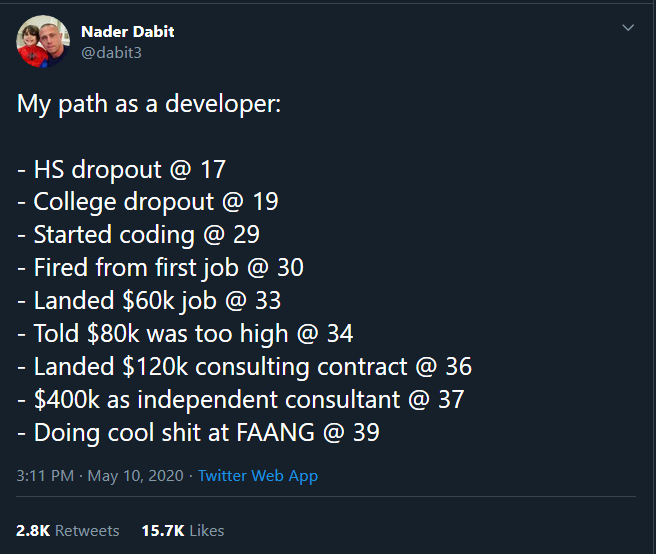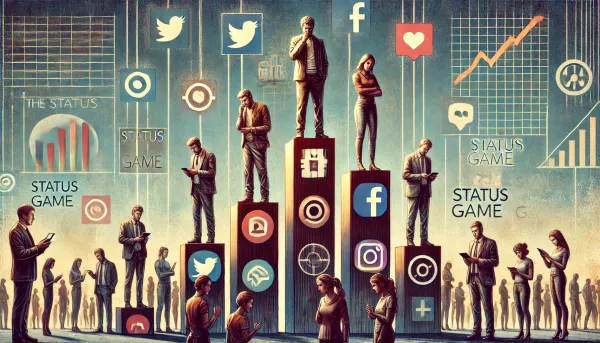My path to where I am now
The path people took to get where they are now. Did it happen overnight? Nope! It started with a Twitter thread; it ended with a detailed description of my path from HTML guy to founder. Here is the story!

Nader Dabit from AWS (currently) started a Twitter thread about career progress and what was his path to get where he is right now. It looks like it was an exciting topic for many as his original post got so far around 2.8k retweets and over 15k likes.

It is not about likes or retweets, but the measure of interest is how many people chimed in with their stories. It sparked a lot of interesting discussions about career choices, decisions, and motivation of individuals.
I prepared my own reply to Twitter. Then I started to think about it and turned it into this retrospective post. Why?
It is not about joining the crowd. I think it is cultural, but in my part of the world (Poland) we don't talk much about it. About our experiences, how we got there, and what was the path.
I thought that it might be interesting for people to see the path to get me where I am now.
In general, I think that many people see only the end state. Where people are right now and are missing a point of what it takes to this point. That the person they compare themselves to or they observe, started somewhere. It wasn't probably the most exciting job and place on Earth.
Another thing is that I want to put a bit of context from this part of the world (Poland). What is the difference? Reading people's answer, I see a gap between my career and theirs in my age. What is the gap? Literally almost the first 20yrs I wasn't doing anything professionally with computers.
Why? Simple - because there wasn't anything to do in this area in Poland. Maybe not anything but very little.
It just makes me appreciate more what we have achieved both as a country and as an industry here.
Here is my path to where I am right now:
- First computer @10
- First paid computer job @20 ($100)
- First FTE position @23 (~$5000)
- Sysadmin @24 ( ~$10k)
- Building dot-com portal @25 (If I remember my salary doubled to roughly $20k)
- Consulting at different companies @27
- Microsoft @30 (~$100k)
- Independent @34 (~$250k)
- Founder at Predica @35 ... till now
It also got me thinking, and I distilled a few thoughts about the choices I've made and the decisions behind it. I put the summary at the end of this post.
- Nice, but what are the conclusions.
- Having a late start is not a problem. It is always a good time to start something new.
- Appreciate the opportunities you have right now
- Stand out! Show off! Most likely, in one area or another, your skills are something unique.
- Do not let money to make your decissions
- If you want to try something, do it!
- Build a long-lasting trust with people
- Working solo is nice. Working in a group is better.
- Last, having a plan and a goal is helpful. Not having one is not bad.
- There is no overnight success.
First computer @10
Around 10. I actually started a bit earlier with access to one of the first PC XTs at my uncle's office. My first computer was Atari 65XE, and it was a feat back then for those who are not familiar with Poland's history.
- We had to first get some USD (which wasn't easy) and then
- buy it in a unique store, where you could pay only with hard currency.
If you would ever have a chance to live in a socialist country - skip it. You would be better off. Believe me.
Then my parents invested in me and bought me a PC AT 12Mhz, so I was PC-boy from the beginning, learning simple coding in Basic and spreadsheets on my own. I also picked up some coding in DB called Paradox.
First paid computer job @20 ($100)
That might be odd if you are not from this part of the world.
Why at 20? What was I doing before? It is simple - before 10 and around my 20's there wasn't really a market for computer jobs in Poland. It started just a few years earlier, so I started my first job during my university time.
It makes a huge difference as we have developed all of it in the last 30 years, and now this industry is booming. Most of my generation and earlier are self-thought computer geeks.
BTW - it was a Microsoft Access database implementation. I was doing similar gigs later as a side job next to my study.
First FTE position @23 (~$5000)
I got a job as an HTML developer/designer - all in one. Fun fact - I hadn't done any of HTML before I started. I did a little just for some text formatting. It also shows the state of the industry back then.
On my first day of work, our sales rep dropped me a few photoshoots and said: "Do a web site for them." It was a hotel next to the highway close to the city I lived in.
It was closest to single page application that I have developed in my life :).
BTW - a few weeks ago, I was preparing for a podcast, and I found out that guys who hired me are still there and still have the same web page. Most likely, there is a code I put somewhere there :).
Sysadmin @24 ( ~$10k)
Shortly after, I switched to the position of sysadmin for Windows at the World Bank Office and a few months later to a similar position at ISP provider. Responsible for Windows and a bunch of Windows / FreeBSD servers. We provided something novel back then:
- Automated, self-service web hosting
- Free e-mail mailboxes.
Sounds like a cloud :)? Yes, it was very similar to what we call the cloud right now. Maybe not that well done (one day, one of our customers run Doom on our server from the image he uploaded - true story).
Building dot-com portal @25 (If I remember my salary doubled to roughly $20k)
ISP was sold and transformed into a dot com company in Poland. We build a portal. We created a web sited for companies to run their front-page and e-mail mailboxes. We got to the IPO on the Polish stock exchange (it is still there as a bank). And we flopped like all other dot-coms. It was too early, and there was no business in it. People didn't have the Internet to use our pages and other services.
BTW - I found out that people still have sites we provisioned for them automatically up and running after 20 years (sic!). It means there was business in it as they most likely still pay for it to someone.
Here is where the magic started
Around this time, I started to write in public and doing my first speaking engagement. The first one was at a security conference in 2001, speaking about the Active Directory security model. It wasn't planned, but in retrospect, it was one of a turning point in my professional career with a set stage for many other things.
Start to write. Start to show-off. Now it is easier than ever. It is also harder than ever :).
I did a lot of writing at this time. I wrote blog. I wrote book. I wrote tons of articles to magazines. Writing is important
Consulting at different companies @27
I moved to infrastructure/security consulting at various Polish companies. Moved to Warsaw. I spent few years in my first job here. I was laid off with all other networking/security folks. Had 3 months stunt at a local polish software house, then hired by HP to Managed Service.
HP was something new. Entered a corporate world and learned ropes how it works (freezes, cuts, travel and expenses, time reports). I learned a bit or two about corporate politics. At HP, it was still a Polish market.
Microsoft @30 (~$100k)
It was a big jump. I moved to Microsoft to Consulting Services. The most significant change was that the local MCS strategy was to work abroad in Europe. It is where I got the first time exposure to customers and projects outside of Poland.
It was also refreshing to work for a big brand in the IT world. People perceive you differently when you have big M on your chest under the suite (not really, we didn't have them).
It is also a period where I started to speak outside of Poland and get some recognition in the international community. It was a really interesting experience, as I could match my experience and what we do with people from outside of Poland.
I learned about the gap we have: most of the people I got to know had a long career in IT starting somewhere in teen days. There was an entire generation gap on our side.
Independent @34 (~$250k)
I decided to quit and become independent in my area. There wasn't a better moment for it:
- I got a good career at Microsoft
- My firstborn just arrived, and we were fresh parents
My first gigs were coming from ... Microsoft, but not solely. I was more lucky than skilled to land a few training engagements since day ONE of being solo.
Actually, my solo work in the first month paid me a few monthly salaries at Microsoft (which wasn't bad). Then I had a couple of projects in a niche, Microsoft IAM, and it became an overnight success for my scale.
There are no overnight successes!
I knew little about building and running a company. I remember that one thing I knew was to keep profit and positive cash flow. I got a bit overwhelmed by my success. It turned out there was a demand for what I did.
Hired some people, started to work with some friends who also started a company.
I started to work 16hrs a day, and my life started to look not precisely how I wanted it to look. Finally, become a founder at Predica
Founder at Predica @35 ... till now
I joined three other guys at Predica (we knew each other from Microsoft briefly), and the rest is history. At the moment I entered, we were 20 people. Quickly scaled down to approx. 10 because some business didn't work as we planned, and we had to lay off some people. Just to track the salary/income progress - my salary was roughly $35k (yearly) as a founder. No bonuses or dividends promised and actually none paid.
Quite a cut from a year of solo work.
Few years forward - we are 250+ people with offices across several countries. The last revenue we have publicly reported at the end of 2017 was around $7M. Pay attention; it is revenue, not my income, and as we invest in the company, the salary varies.
It is where I am at the moment and plan to stay for a while.
Nice, but what are the conclusions.
Writing it down and thinking about it gave me some conclusions that might be applicable for others as well:
Having a late start is not a problem. It is always a good time to start something new.
Compare do many people at the market right now, I had a late start. I wasn't doing anything professionally with IT until 24. I don't think it is a problem even now. It is only an image that IT is for young people and startups. It isn't. There is always an excellent way to start.
Appreciate the opportunities you have right now
It was also a different situation back then. Right now, with all the opportunities around, ways to build your profile and technology at hand, really, the sky is the limit.
Remember. Back then, if I wanted to try something new or have two computers talking to each other, I literally had to have two computers. And network. No virtualization attached.
I'm against hustle. I don't think it is a viable approach and a good one. I did my part. You don't need to hustle to get things done. But if you are not taking this opportunity, if you are already healthy, in the IT industry, educated and well - it is your choice.
Not taking the opportunity or doing it small is also good. As long as you feel right with it.
The only wrong choice is to not be happy about the place you are right now and not doing anything about it.
Stand out! Show off! Most likely, in one area or another, your skills are something unique.
The way you are doing it is unique. It is not showing off for the sake of fame. It creates your options, which might come handy later down the road. It calls for a separate post. I think that when I decided to take some action and engage in speaking, doing something extra work, stepping in where others didn't were a critical point in my development.
Long term - all of them paid off. Even if I have not thought about it in a currency at the moment, it happened.
Do not let money to make your decissions
My career choices were never money-driven. Easy to say now, but I think that money is the wrong approach to making decisions. At least when you reach a certain security level for your basic needs, family, and financial safety (always save for rain day, it will come).
There was an element of money in the deal (it is a mutual deal at the end), but decision alone was never driven by money. Initially, it was about changing a place to the one I can learn more and do something new. Best if with smart people around. Then when I switched to Microsoft, it was about ... yeah, Microsoft. I have to admit it. There also was a part of skills - I know that at that time, I would not be able to do such things in other companies in Poland. But at least in the first year, it was refreshing to work for Microsoft ;).
Being on the hiring side now, I see people who are unable to make a decision because they can't afford to leave the current status or position from a financial perspective. Short terms - it provides a good outcome. Long term, I don't think it will pay off.
I did a jump twice.
- First, when I changed from Microsoft to solo - I had literally ZERO customers and deals. I went from a good salary to NO INCOME secured. It played out well but also could play out differently.
- The second time it was when I changed from solo to company. I could stay solo and most likely doing brilliantly for next year. Maybe I would even establish a small consulting shop, which was my goal at the beginning (I pivoted early :)).
But I did, and I do not regret it.
If you want to try something, do it!
It was a thing with my change to independent consulting. I always wanted to try it. I was tinkering with this thought for more than a year. It was never the right time. Right now - I would do it earlier. Why? Because in most cases, there is nothing (or at least not a lot) to lose and what can go really wrong. I mean - REAAALYYY WRONG.
It doesn't mean you can jump the cliff unprepared. Think about what you need to survive and be secure for SIX months. Better for TWELVE months. Prepared. Execute.
Build a long-lasting trust with people.
When you meet people you can trust along your way, stick to them. Trust is everything in the long term. It takes time to build. It takes time to establish a relationship based on trust. But once you have it, it will be your best leverage. It goes in two ways. You have to put your work into building trust as well.
Working solo is nice. Working in a group is better.
Being independent is nice. It gives freedom. It provides income (mostly).
Working with trusted people and building something more significant is better (at least in my current opinion). Why? It gives you the leverage you can't build on your own. Advantage of people having your back, the organization to support you, other skilled people doing a heavy lifting where you can't or don't have time to learn.
It doesn't come without work from your side. You still have to put your work in there. Why? If you will not do it, why should others do it for you?
I would not trade building a company with all 250 people at the moment for being independent, even if paid bigger bucks (probably it would).
Last, having a plan and a goal is helpful. Not having one is not bad.
To be completely frank, a lot of what happened at the beginning of my career was "DYNAMIC". I haven't had a plan, and a goal, like I, will do this at my 30's and I will be in this place at my 40's. It wasn't a conscious decision. It was my way of doing it at this stage of my life.
Now I do it a bit differently. I have a goal set - I will write about it as well. Right now, I appreciate having a goal, a direction, and a plan. However, if you don't have one, and you don't have an idea for one at the moment, don't feel bad about it. I know the entire world says you should have one. You should set your goals and achieve those.
The entire world is doing it to get your attention. Maybe you haven't figured out what you really want to be doing.
Not having a goal is OK. Experiment. You don't know where it will take you in the long run. Make sure to do some checkpoints along the way are you still happy with where it is going.
There is no overnight success.
If something looks like it, it is one of two things:
- A LOOOT of LUCK
- Or it is fake
That's all, folks. I turned a short tweet into a lengthy post. I hope you enjoyed it. If you have any questions about my career path, choices, thoughts - comments are open.
Photo by Michel Porro on Unsplash.




